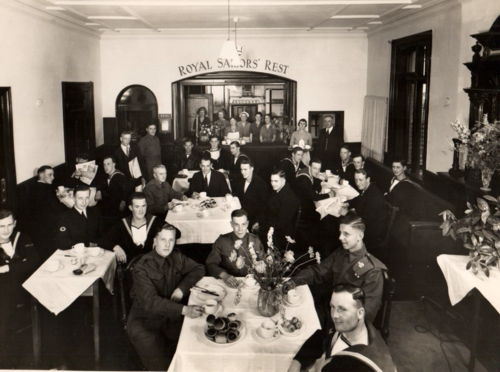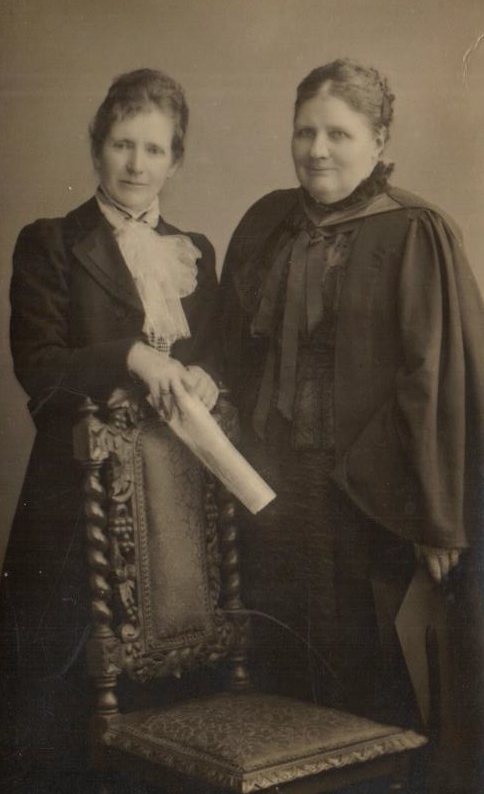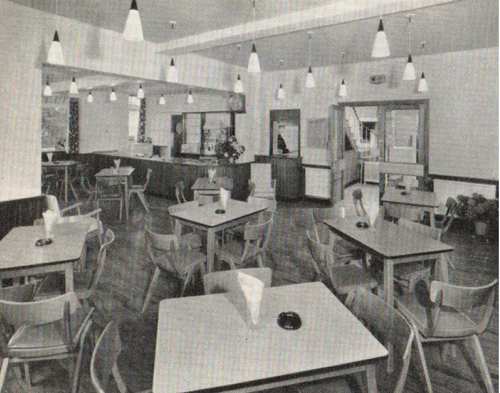Our History
Founded in 1876 by Dame Agnes Weston, (who was known to all as 'Aggie'), Aggie's is a charity with a rich history. We have adjusted our methods and objectives with the times, but we have always strived to deliver assistance and support to serving sailors, marines and their families.
1870’s – In the Beginning
The first of the Sailors’ Rests was in Devonport close to the gates of the Dockyard, and opened officially on the 8th May, 1876. The various Rests came as a result of a request for a temperance house, a “bar without drink”, that the sailor could go to for recreation and relaxation.
1880’s – More Rests Please!
The success of the Devonport Sailors’ Rest, led to a similar project being opened in Portsmouth to provide baths, lodgings and recreational activities and facilities. Rests were also opened at Portland and Sheerness.
1890’s – The Royal Years
Agnes Weston was granted a Royal warrant by Queen Victoria, so that in future the Rests were known as the ‘Royal Sailors’ Rests’. Queen Victoria invited Miss Weston to visit her at Windsor, in which she let her know: “I do not forget to pray for you”.
In 1890, Aggie opened a Naval Disaster Fund, to care for wives and their families, as a response to the loss of HMS SERPENT, and all men on board.
1900’s – Agnes Weston’s Final Years
Aggie passed away on the morning of the 23rd October 1918. Before she died, Agnes Weston was elevated to the honour of Dame Grand Cross of the Most Excellent Order of the British Empire. She was the first woman ever to be buried with full naval honours. Her epitaph reads simply: “The sailor’s friend.”
In 1901, Agnes Weston received the honour of a degree of Doctors of Laws at Glasgow University, the first woman ever to do so!
1920’s – Under New Leadership
The work of the Rests continued under the leading of Dame Agnes close friend and colleague Sophia Wintz. Dame Sophia Wintz passed away in 1929, and was given the same naval funeral Honours as Dame Agnes, who she was laid next to, to rest.
The task now fell to the Board of Trustees, to continue the work that had been established. They were to strive to act upon the motto that was adopted by Aggie and Sophia: “For the Glory of God, and the Good of the Service”.
1940’s – Destruction and Re-building
In 1941 during the Second World War, the Rests in both Devonport and Portsmouth were blitzed and destroyed within a few weeks of each other. Some said this was the end of Aggie Weston’s, but within a short time, canteen work resumed, with a mobile canteen unit provided by the British War Relief Society of the USA. A Few weeks later, a house was rented in Portsmouth and another in Devonport, as temporary accommodation where the Rests were re-established.
1950’s – Planting Our Feet
In 1951, the Portsmouth Rest planted its feet at the corner of Edinburgh Road, close to the dockyard gates. In Devonport, the trustees decided to build an entirely new and modern rest on a building site near the dockyard. The work was completed, and the Rest was opened to the Navy. All 200 rooms were booked that weekend, and every weekend after until the trustees decided to add 50 more cabins, and a wing for Wrens.
1960’s – The Decade of Growth
During this Decade, even more Rests were established. In Weymouth, an old public house was converted into a small Rest, with 17 Cabins. In 1963, the first overseas Rest was completed in Singapore, complete with a swimming pool! New families’ centres were opened in Southsea and Lossiemouth, as transition accommodation for Naval Ratings, returning to the UK with their families. A Christian community centre and mission hall was built in Rowner Gosport, and another families’ hotel was opened in Southsea. From each of these establishments, the Missioners went out and visited service units.
The 60’s also saw two Royal visits. The First of these was the visit of our patron Her Majesty the Queen and His Royal Highness the Duke of Edinburgh to the Rest in Devonport in 1962. Then in 1964, a visit from Her Majesty Queen Elizabeth the Queen Mother to the office headquarters.
1970’s – From Rests to Centres
As the ways of the Navy changed, and the need for accommodation reduced, the charity saw the first Rest to close in Weymouth in 1973.
The trustees made the decision for the rests to be known as ‘Centres’ instead of ‘Rests’, to resonate with the various sports, activities, events and groups that took place there. Some of these included a youth group formed of service children, and an Aggie’s choir which included staff and beneficiaries!
1980’s – Sport and Adventure
Activities the centre’s continued to thrive. The squash courts at the Camden proved very popular, and held the Portsmouth Area Squash Championships, and training sessions with the official Navy squash coach. The 1980’s saw the return of the Aggie’s Adventure Unit. The unit was a canoe trailer, which had a caravan style camp kitchen. The Adventure unit and campsite was used mainly at weekends for Missioners, and naval Christians for fellowship getaways, and for family weekends.
1990’s – Changing Titles
The trustees decided to change the Missioners title, to be known as Chaplaincy Support Workers. The roles included managing the various centres, family support work, and youth work.
2010’s – Aggie’s Today
The demand for accommodation continued to decrease due to greater geographical stability for naval families and improvements in Service accommodation. Braeholm, in Scotland, was the last accommodation centre to close in 2015. The focus of the charity increasingly moved to the provision of pastoral workers (in all naval base areas, air stations, training schools and Royal Marine units), Haven coffee shops within chaplaincy centres, and projects such as Storybook Waves. The charity widened its reach to support the Royal Fleet Auxiliary and established specific teams under the banner of Community Waves to provide pastoral support to families around major naval base areas: providing support, running activities and hosting events.












